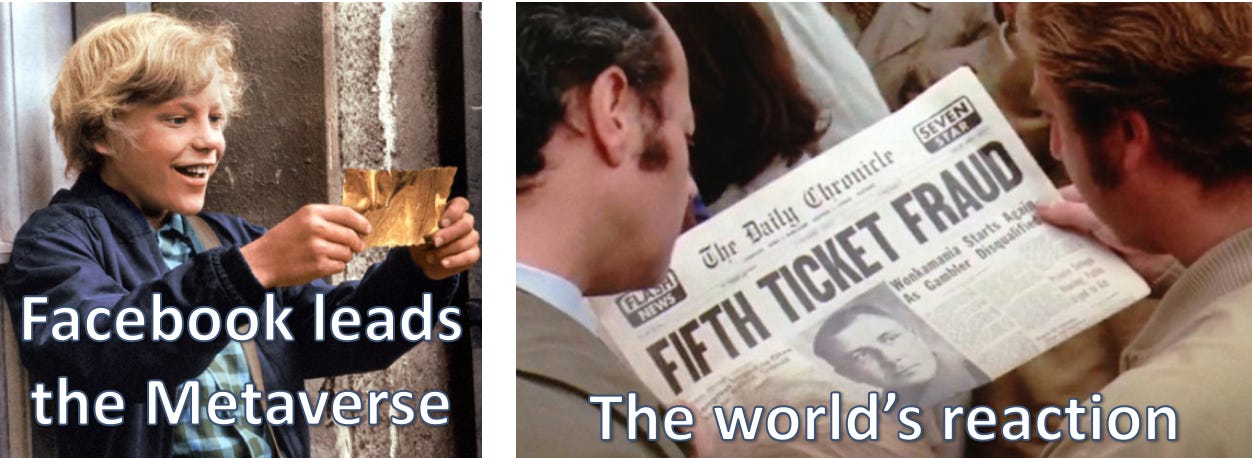(Photo credits: Willy Wonka and the Chocolate Factory (1971))
When I was in high school, I played soccer. I had played soccer since I was about 8 or 9 years old. I loved soccer.
But apparently soccer did not love me. I stubbornly pursued the varsity team, training to run sub 8 minute miles, practicing in my back yard until it was dark, everything I could do to make sure I deserved the spot on the team. But none of it seemed to make a difference. Every year, I made the junior varsity team.
Here is the embarrassing part of this story. Every player was guaranteed to make varsity their senior year. But our new coach decided to change the rules when it was my turn. He instead changed it to a half varsity and half JV spot. This affected only two players on the team, myself and one other girl.
How else can you interpret it other than that coach decided I was not very good? No matter my intentions or my heart, my skills just weren't where they needed to be at that time.
The same is true of Facebook, even though I don't consider them to be trying that hard. When I attended my first IAPP conference in 2012, I was very impressed by their polished privacy lawyer, who was on stage doing a Ted style talk. But wealth of knowledge and fancy clothes cannot hide the fact that Facebook has a privacy problem. I don't think they will ever have the skills to join the varsity online privacy team and that is why they should never be allowed to lead the Metaverse.
I don't know much about the Metaverse. My imagination immediately turns to Ready Player One as the visual depiction of this world. But I am confident in my opinion that the Metaverse deserves to be led by those who are skilled at online privacy.
Here's why: the Metaverse is meant to create a new world where physical limitations do not exist, like bringing a concert to those who cannot attend in-person events. These opportunities have to be considered through the privacy lens. Privacy should be treated like sitting on the toilet. Everyone assumes you want privacy while sitting on the toilet and I feel fairly confident that toilet sitting will not be a physical experience that is brought into the Metaverse. Because it is private.
Taken a step further, we have to consider the availability of anonymity in the Metaverse. Free Guy, a recent movie that hints at a Metaverse, emphasizes the freedoms people seek in the virtual world such as shooting at NPCs, which is seen as distopian, or such as living on a beautiful island, which is seen as utopian. What excites people about the Metaverse is the opportunity for a different circumstance, experience, persona, etc. without consequences of guilt, fear, remorse, embarrassment or shame.
Now, privacy and anonymity are not the same thing, but they are both important freedoms that the Metaverse should intelligently and ethically consider. If you kill people in the Metaverse, are you more likely to kill people in the real world? This is a data decision, and a law enforcement one, and complex given current results. It is also a question of where does the virtual cross over into the physical. Even if you argue for no "leader” of the Metaverse, we need an organized approach to addressing these issues, which requires thinking of them in the first place.
Facebook has proven time and time again that they are not the ones to think these issues through beforehand and take the position of seeking forgiveness if they do. NBC did a great timeline on their privacy missteps, which started in 2006. Sure, they have suffered more at the hands of privacy than any other company, but does that mean their privacy skillset is improving? As I learned the hard way in soccer, practice does not always make perfect.
I will end this post with one final thought. If the rules of the Metaverse don't take the learnings from our physical world experience, and adopt protections for the marginalized, then the Metaverse will not succeed.
At the end of the day, Ready Player One is simply a modern version of Charlie and the Chocolate Factory. There is a moral to these stories. To the victor goes the spoils, but along the way the victor learns mighty lessons and understands the enormity of the responsibility, and adjusts their behavior to be deserving of it.
In other words, I don't think Facebook has shown that it deserves a golden ticket.
I can't stand by and let Facebook lead this new virtual world, called the Metaverse. If you agree or want more content like this one, please share it with your friends and encourage them to subscribe because that is feedback that you like what we are doing. Opinions are my own. You're the best, Caroline, CEO & Co-Founder, www.clearops.io





